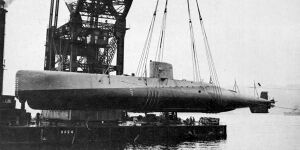Engineering:Submarine No.71
 Submarine No.71 in 1938
| |
| Class overview | |
|---|---|
| Name: | Number 71 |
| Completed: | 1 |
| Scrapped: | 1 |
| History | |
| Name: | Number 71 |
| Builder: | Kure Naval Arsenal |
| Laid down: | December 1937 |
| Launched: | August 1938 |
| Commissioned: | 1938 |
| Fate: | Scrapped 1940 |
| General characteristics | |
| Class and type: | Experimental high-speed submarine |
| Displacement: |
|
| Length: | 42.8 m (140 ft 5 in) |
| Beam: | 3.3 m (10 ft 10 in) |
| Draft: | 3.1 m (10 ft 2 in) |
| Installed power: |
|
| Propulsion: |
|
| Speed: |
|
| Range: |
|
| Test depth: | 80 m (260 ft) |
| Complement: | 11 |
| Armament: | 3 × bow 450 mm (17.7 in) torpedo tubes |
Submarine No.71 (Number 71) was an experimental high-speed submarine built for the Imperial Japanese Navy (IJN) during the 1930s.
Design and description
Submarine No.71 was designed to test high-speed performance underwater. Intended to reach 25 knots (46 km/h; 29 mph) underwater and 18 knots (33 km/h; 21 mph) on the surface, she proved to be too underpowered to reach those goals. Nonetheless, the boat was the fastest submarine in the world underwater when built,[1] beating the previous record set by the similar World War I-era British R-class. She displaced 216 tonnes (213 long tons) surfaced and 244 tonnes (240 long tons) submerged. Submarine No.71 was 42.8 meters (140 ft 5 in) long, had a beam of 3.3 meters (10 ft 10 in) and a draft of 3.1 meters (10 ft 2 in).[1]
For surface running, the boat was powered by a single 1,200-brake-horsepower (895 kW) diesel engine that drove one propeller shaft. When submerged the propeller was driven by a 1,800-horsepower (1,342 kW) electric motor. She could reach 13.25 knots (24.54 km/h; 15.25 mph) on the surface and 21.25 knots (39.36 km/h; 24.45 mph) underwater. On the surface, Submarine No.71 had a range of 3,830 nautical miles (7,090 km; 4,410 mi) at 12 knots (22 km/h; 14 mph); submerged, she had a range of 33 nmi (61 km; 38 mi) at 7 knots (13 km/h; 8.1 mph). The boat was armed with three internal bow 45 cm (17.7 in) torpedo tubes; each was provided with one torpedo.[1]
Construction and career
Submarine No.71 was laid down by the Kure Naval Arsenal in December 1937 and was launched that same month by being lowered into the water by a crane. She was completed in August 1938; trials showed that her small size and low-powered diesel made her hard to handle on the surface. While incapable of her intended speeds, she exceeded a submerged speed of 21 knots,[1] almost five years before the famous German type XXI U-boats achieved speeds of around 18 knots (33 km/h; 21 mph).[2] After extensive evaluations the boat was scrapped in 1940, and the lessons learned contributed to the development of the Sen Taka-class, and the Sen Taka Sho-class.[1]
See also
- German submarine V-80
- British R-class submarine
Notes
References
- Bagnasco, Erminio (1977). Submarines of World War Two. Annapolis, Maryland: Naval Institute Press. ISBN 0-87021-962-6.
- Carpenter, Dorr B.; Polmar, Norman (1986). Submarines of the Imperial Japanese Navy 1904–1945. London: Conway Maritime Press. ISBN 0-85177-396-6.
- Chesneau, Roger, ed (1980). Conway's All the World's Fighting Ships 1922–1946. Greenwich, UK: Conway Maritime Press. ISBN 0-85177-146-7.
 |

